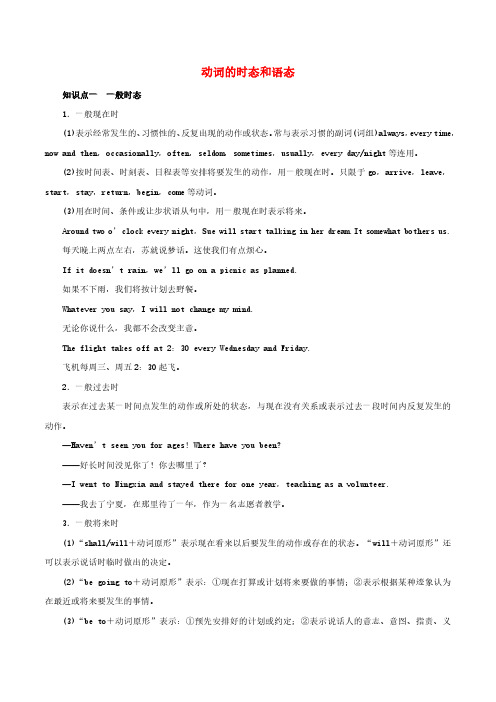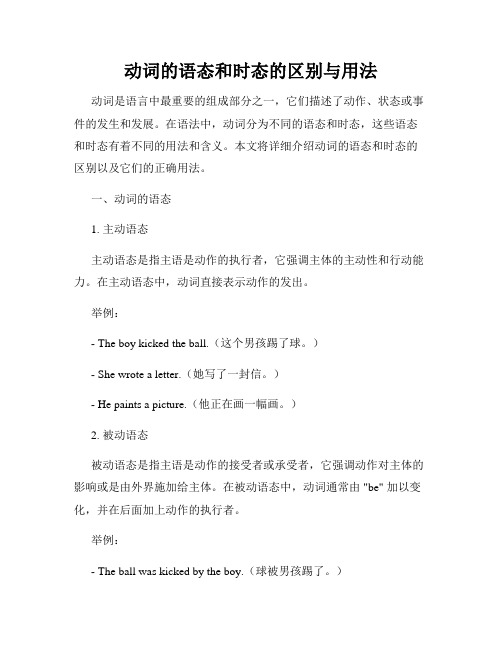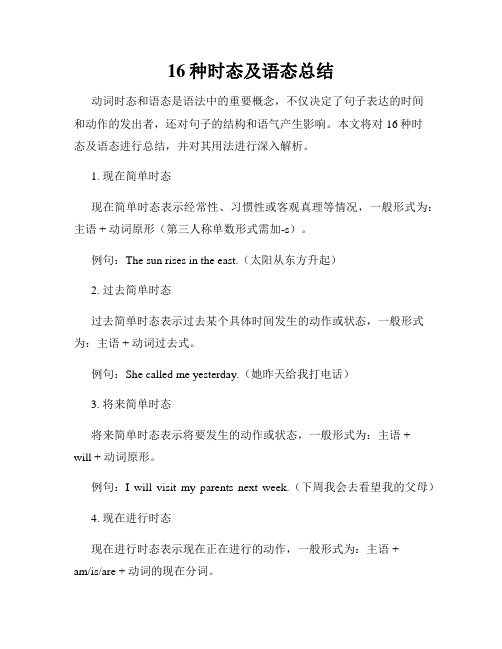动词的时态和语态
英语动词时态和语态

动词的时态和语态知识点一一般时态1.一般现在时(1)表示经常发生的、习惯性的、反复出现的动作或状态。
常与表示习惯的副词(词组)always,every time,now and then,occasionally,often,seldom,sometimes,usually,every day/night等连用。
(2)按时间表、时刻表、日程表等安排将要发生的动作,用一般现在时。
只限于go,arrive,leave,start,stay,return,begin,come等动词。
(3)用在时间、条件或让步状语从句中,用一般现在时表示将来。
Around two o’clock every night,Sue will start talking in her dream.It somewhat bothers us.每天晚上两点左右,苏就说梦话。
这使我们有点烦心。
If it doesn’t rain,we’ll go on a picnic as planned.如果不下雨,我们将按计划去野餐。
Whatever you say,I will not change my mind.无论你说什么,我都不会改变主意。
The flight takes off at2:30every Wednesday and Friday.飞机每周三、周五2:30起飞。
2.一般过去时表示在过去某一时间点发生的动作或所处的状态,与现在没有关系或表示过去一段时间内反复发生的动作。
—Haven’t seen you for ages!Where have you been?——好长时间没见你了!你去哪里了?—I went to Ningxia and stayed there for one year,teaching as a volunteer.——我去了宁夏,在那里待了一年,作为一名志愿者教学。
3.一般将来时(1)“shall/will+动词原形”表示现在看来以后要发生的动作或存在的状态。
动词时态和语态总结

四、现在进行时 1.表示说话时正在进行而尚未完成的动作或状态。
We are having an English lesson. 2.表示现阶段一直在进行的动作,但说话时不一定正在进行。
The workers are building a new factory.
3.有时可表示即将发生的动作〔只限于go, come, stay, leave, start, begin, arrive, return, fly, drive等动词〕这时常有一个
played table tennis almost everyday. 4〕在条件、时间状语从句中表示过去将来的动作。
They said they wo精u品lPdPTlet us know if they heard any news about him.
三. 一般将来时 一般将来时表示将来要发生的动作和存
精品PPT
二、一般过去时 1〕表达特定的过去时间内发生的动作或存在的状况,
常与last week/year/ month/ spring, a few days ago, in 1998等时间状语以及when等连词引
导的时间状语从句连用。
We had a good swim last Sunday.
3〕用在问句中,表示委婉礼貌; Will you be reading anything else? When shall we be meeting again?
When I was young, I took cold baths regularly. 2〕表达过去连续发生的一件件事。
He got up early in the morning, fetched water,
动词的语态和时态的区别与用法

动词的语态和时态的区别与用法动词是语言中最重要的组成部分之一,它们描述了动作、状态或事件的发生和发展。
在语法中,动词分为不同的语态和时态,这些语态和时态有着不同的用法和含义。
本文将详细介绍动词的语态和时态的区别以及它们的正确用法。
一、动词的语态1. 主动语态主动语态是指主语是动作的执行者,它强调主体的主动性和行动能力。
在主动语态中,动词直接表示动作的发出。
举例:- The boy kicked the ball.(这个男孩踢了球。
)- She wrote a letter.(她写了一封信。
)- He paints a picture.(他正在画一幅画。
)2. 被动语态被动语态是指主语是动作的接受者或承受者,它强调动作对主体的影响或是由外界施加给主体。
在被动语态中,动词通常由 "be" 加以变化,并在后面加上动作的执行者。
举例:- The ball was kicked by the boy.(球被男孩踢了。
)- A letter was written by her.(一封信被她写了。
)- The picture is being painted by him.(这幅画正在被他画。
)被动语态多用于强调动作的接受者或者主体的无法执行动作的情况。
二、动词的时态1. 现在时现在时态用于表示目前正在进行或经常发生的动作、状态或事件。
举例:- I go to school every day.(我每天去学校。
)- She is reading a book now.(她现在在读一本书。
)- They often play football on weekends.(他们经常在周末踢足球。
)2. 过去时过去时态用于表示已经发生或已经结束的动作、状态或事件。
举例:- I went to the park yesterday.(我昨天去了公园。
)- He studied in the library for three hours.(他在图书馆学习了三个小时。
动词的时态语态

The boy is always talking in class.
We are leaving for Guangzhou tomorrow.
将 来
按计划一般不易变更 的动作,常发生在比 较近的将来
3. 某时(或某段时间内) I was doing my homework 正在进行的动作 this time last night. 过 去 带有感情色彩的叙述 故事发生的背景 He was making trouble all the time. He was reading a book when we came in.
The book is difficult to understand.
He is easy to get along with. 4. 不定式作名词的后置定语,与被修饰的名词构成逻辑上的动宾关系,又和句子的 主语或宾语构成逻辑上的主谓关系 He has a lot of work to do this evening. I’ll give him something to eat. 5. 不定式to blame, to let等表示被动含义
瞬间动作
固定不变或不易变 的动作或状态
将 来
(在从句中)用现在 时代替将来时
不受时间限制的动作或 状态
2. 现 在 进 行 时
现 在
某时(或某段时间内) He is writing a letter now. 正在进行的动作 She is visiting Beijing this week. 带有感情色彩的叙述
The car is to let.(汽车出租)
Exercises:
1. Let’s keep to the point or we ___ (never reach) any decision. 2. My mind wasn’t on what he was saying so I’m afraid I ___ (miss) half of it. 3. The house could fall down soon if no one ___ (do) some quick repair work. 4. Now that she is out of a job, Lucy ___ (consider) going back to school, but she hasn’t decided yet. 5. The mayor of Beijing says that all construction work for the Beijing Olympics ___ (complete) by 2006. 6. The teacher, with 6 girls and 8 boys of her class, ___ (visit) a museum when the earthquake struck.
16种动词的时态和语态

【主动语态】一般现在时:do一般过去时:did一般将来时:willdo现在进行时:be doing(be随人称变化)过去进行时:was/weredoing现在完成时:have/has done过去完成时:had done过去将来时:woulddo将来完成时:will have done将来进行时:will be doing将来完成进行时:will have been doing现在完成进行时:have been doing过去将来完成时:would have done过去完成进行时:had been doing过去将来进行时:would be doing过去将来完成进行时:would have been doing【被动语态】一般现在时:be done(be随人称变化)一般过去时:was/were done一般将来时:will be done现在进行时:be being done(前面的be随人称变化,后面的being固定)过去进行时:was/were being done(being固定)现在完成时:have/has been done过去完成时:had been done过去将来时:would be done将来完成时:will have been done将来进行时:will be being done(being固定)将来完成进行时:will have been being done现在完成进行时:have been being done过去将来完成时:would have been done过去完成进行时:had been being done过去将来进行时:would be being done过去将来完成进行时:would have been being done。
动词的时态和语态

动词的时态和语态时态一.一般现在时1.表示客观真理、科学事实The sun rises in the east and sets in the west.2.表示现在经常或习惯性的动作, 常与频度副词连用,如always, often, seldom, usually。
He always sleeps with the window open.3.在条件和时间状语从句中通常用一般现在时表示将来If it is fine tomorrow, we will go to the countryside.二.现在进行时is/are doing1.表示说话时正在进行的动作--- What are you doing? --- I am writing a letter.2.表示现阶段一直在进行的动作Jane is studying law while her sister is doing physics.注意:现在进行时的这一用法也表示一种暂时性。
请比较:He ____________ in a chemical factory. (经常性工作)He ________________ in a chemical factory these days. (临时性工作)3.现在进行时与always, constantly, for ever等频度状语连用,多半表示说话人的不满情绪。
You ____________________________(find) fault with me.三.现在完成时has/have done常用的时间状语有: since, ever since, so far, up to now, in the past three years等。
He has turned off the light. (The light is off now.)* This/It is the first/second…time that sb has doneThis is the third time (that) you ________________ (make) the same mistake.* 在条件、时间状语从句中,用现在完成时表示动作发生在主句谓语动词之前I will not believe you unless I _________________ (see)it with my own eyes.四.现在完成进行时has/have been doingI have been writing letters all this morning.注意:①现在完成时表示一个已经完成的动作,而现在完成进行时强调动作仍在继续Li Jia ______________ (read) a book about Stonehenge. (She finished reading the book.)Li Jia ______________ (read) a book about Stonehenge. (She is still reading the book.)②现在完成时与现在完成进行时有时可以互换,但现在完成进行时更强调动作的延续性。
动词时态和语态

动词时态和语态一:时态1. 一般现在时 do/ does/ am/is/are 表示客观事实或普通真理或经常性的动作。
The teacher told us the earth moves around the sun.He often stays up till midnight to catch up with others.在时间、条件状语从句中常用一般现在时代替将来时(主将从现)。
但要注意由if 引导的条件状语从句中可以用shall(第一人称)或will表“意愿”,但不表示时态If it rains tomorrow, I won't go there.If you will accept my invitation and come to our party, my family will be pleased.2. 一般过去时did/ was/ were表示过去的事情、动作或状态常与表示过去具体的时间状语连用(just now, last year, in the past, last, after +一段时间,since 的从句中,the other day),或有上下文语境暗示------刚才”“在过去”,暗示“现在已不再这样”He lived in London for three years.(现在不在伦敦了)I thought he was an American.(我原以为他是美国人)注意:It's (high/about) time (that) +主语+一般过去时It is time that we got up.It's two years since he smoked.(他不抽烟已两年了)3. 现在完成时have/has done现在完成时则强调的是截止到现在为止所发生的事或者过去发生的事对现在的影响(标志词:since,in the past/last/recent +some time,just,recent(ly),lately,so far=up to now =up until now=by now,already,yet,several/many/...times)He has lived in London for three years.(现在还住在伦敦)注意:(1)在时间、条件状语从句中常用现在完成时代替将来完成时(主将从现) Don’t believe his words until you have looked into the case.(2)It/This is + 第几次/ 最高级+ 现在完成时This is the most instructive lecture I have attended.It is the third time that you have visited our school.4. 现在完成进行时:have/has been doing表动作从过去一直延续到现在说话时刚结束或该动作还将进行; 未完成性和暂时性They have been building a factory.现在完成时与现在完成进行时的区别:两者都可以表示“从过去开始一直持续到现在”,在含义上如着重表示动作的结果时,多用现在完成时,如着重表示动作一直在进行,即动作的延续性时,则多用现在完成进行时。
16种时态及语态总结

16种时态及语态总结动词时态和语态是语法中的重要概念,不仅决定了句子表达的时间和动作的发出者,还对句子的结构和语气产生影响。
本文将对16种时态及语态进行总结,并对其用法进行深入解析。
1. 现在简单时态现在简单时态表示经常性、习惯性或客观真理等情况,一般形式为:主语 + 动词原形(第三人称单数形式需加-s)。
例句:The sun rises in the east.(太阳从东方升起)2. 过去简单时态过去简单时态表示过去某个具体时间发生的动作或状态,一般形式为:主语 + 动词过去式。
例句:She called me yesterday.(她昨天给我打电话)3. 将来简单时态将来简单时态表示将要发生的动作或状态,一般形式为:主语 +will + 动词原形。
例句:I will visit my parents next week.(下周我会去看望我的父母)4. 现在进行时态现在进行时态表示现在正在进行的动作,一般形式为:主语 +am/is/are + 动词的现在分词。
例句:They are studying in the library now.(他们现在正在图书馆学习)5. 过去进行时态过去进行时态表示过去某一时刻正在进行的动作,一般形式为:主语 + was/were + 动词的现在分词。
例句:I was watching TV when he called me.(他给我打电话的时候,我正在看电视)6. 将来进行时态将来进行时态表示将来某一时刻正在进行的动作,一般形式为:主语 + will be + 动词的现在分词。
例句:She will be studying abroad this time next year.(明年这个时候她将在国外留学)7. 现在完成时态现在完成时态表示过去发生的动作对现在造成的影响或状态,一般形式为:主语 + have/has + 动词的过去分词。
例句:He has already finished his homework.(他已经完成了作业)8. 过去完成时态过去完成时态表示过去某个时间或动作发生之前已经完成的动作,一般形式为:主语 + had + 动词的过去分词。
- 1、下载文档前请自行甄别文档内容的完整性,平台不提供额外的编辑、内容补充、找答案等附加服务。
- 2、"仅部分预览"的文档,不可在线预览部分如存在完整性等问题,可反馈申请退款(可完整预览的文档不适用该条件!)。
- 3、如文档侵犯您的权益,请联系客服反馈,我们会尽快为您处理(人工客服工作时间:9:00-18:30)。
动词的时态语态 (一)时态:表示动作发生或存在状态以及表现方式的一种动词形式。
语态:用来说明主语和谓语之间关系的一种动词形式。
主动语态表示句子的主语是动作的执行者或行为的主体;被动语态表示主语是动作的承受者或行为的对象英语中,在不同时间,以不同的方式发生的动作或存在的状态要用动词的不同形式表现出来,动词的这些不同形式构成了动词的时态。
一般来说,发生在现在的事情用现在的时态进行描述,发生在过去的事情,用过去的时态进行描述,将要发生的事情用将来的时态进行描述。
英语中的时态共计16种,常用的有12种。
现在进行时、过去进行时、现在完成时、过去完成时、现在完成进行时。
本次课我们主要讲解一般现在时、一般过去时以及一般将来时一. 一般现在时1. 基本结构肯定形式:① be动词:am/ is/ are②行为动词:动词原形、第三人称单数。
否定形式:① am /is / are+ not②don’t /doesn’t +动词原形+……一般疑问句:①把be动词放于句首②Do/Does +…+ 动词原形+…?特殊疑问句:特殊疑问词+一般疑问句2.一般现在时的第三人称单数的构成:3.基本用法:①表示经常性或习惯性的动作,常与表示频度的时间状语连用。
时间状语有:always, usually, often, sometimes, every week (day, year, month…), once a week, on Sundays等。
例:I leave home for school at 7 every morning.②表示客观真理,客观存在或科学事实,以及格言或名言警句中。
如:The earth moves around the sun.Shanghai lies in the east of China.Failure is the mother of success. 失败乃成功之母。
③表示爱好、能力、性格、个性。
I like Chinese food.I don’t want so much.Ann Wang writes good English but does not speak well.4. 特殊用法①一般现在时代替将来时1. 时间状语从句、条件状语从句用一般现在时代替将来时。
如:when, before, after, till, once, as soon as, if, in case (that), unless,等。
He is going to visit her aunt the day he arrives in Beijing. 他一到北京,就去看他姨妈。
Iwill call you as soon as I go back home. 我一到家就给你电话。
注:1. 可以代替as soon as表示一……就的词语:the moment、the minute、immediately、instantly2. 主句部分除了用一般将来时,还可以用祈使句以及情态动词例:If you have any problem, please contact me. (主祈从现)If you have any problem, you can contact me.(主情从现)3. not…until用法总结:A. sb didn’t do sth until sb did sth.I didn’t go home until I finished my hom ework yesterday. 我昨天直到完成作业才回家B. sb won’t do sth until sb do/does sth.(主将从现)I won’t leave until you come tomorrow. 我明天会直到你过来才会离开。
练习:翻译下面的句子1. 昨天修理完桌椅后,我们才回家。
答案:We didn’t go home until we finished repairing desks and tables.2. 有时候,直到珍贵的时刻成为了回忆,你才会真正认识到它的价值所在。
答案:Sometimes, you won’t know the true value of a moment until it becomes a memory.2. 用于表示较固定的,按计划、规定将要发生的动作,但只限于begin, come, go, leave, arrive, stop, return, close, open, take, start, take place 等少数动作。
例:The train leaves Beijing at six and arrives at Jinan at nine.②一般现在时代替进行时句型:Here comes… ; There goes…例:Look, here comes Mr. Li.There goes the bell.二. 一般过去时1. 基本结构肯定形式:①be动词:was / were …②行为动词:动词的过去式否定形式:① was/ were + not②didn’t +动词原形一般疑问句:① was或were放于句首②Did + … + 动词原形……?特殊疑问句:特殊疑问词+一般疑问句2. 动词的过去式及过去分词的构成:规则动词的变化:规则动词的过去式和过去分词的构成方法是相同的。
①表示过去某一具体时间发生的动作或存在的状态,常用的时间状语有last year, yesterday, just now, in +过去年份, a few years ago, in the past.例:Yesterday, I saw my friends off at the airport.②表示过去的经常性、习惯性动作或状态,常用的时间状语有always, often, usually, sometimes, seldom, never等例:I always got up late and never had enough time for breakfast when I was a child.三. 一般将来时结构+用法①“will/ shall + 动词原形”构成将来时,表示将要发生的动作或将要存在的状态。
shall仅用于第一人称I/we作主语,而will 则用于各种人称。
常用于将来时的时间状语有:next time, tomorrow, this afternoon, before long,in the future, soon, the day after tomorrow.例:I shall visit my teacher when I go to Beijing.②“be going to + 动词原形”,表示打算、计划、安排做某事。
例:We are going to hold a sports meet next weekend.③ begin, leave, arrive, start, finish, meet, return等动词的一般现在时,表示按计划或安排将要发生的事。
(时刻表)例:Flight 55 leaves at six p.m.④ leave, go, come, stay, do, take, have 等动词的现在进行时,表示按计划或准备要做某事。
例:She is leaving early tomorrow morning. 明天她很早就出发。
⑤“be to + 动词原形”,表示即将发生某事、安排做某事或要求做某事。
例:The meeting is to take place at 8:00 tomorrow.⑥“be about + to+动词原形”,表示即将发生某事,不与具体的将来时间状语连用例:Hurry up! The train for Shanghai is about to start.注意:1. shall/will do和be going to do的区别shall/will do表示一种趋势或习惯性动作,或预言将要发生的事,或表示临时性打算等。
Fish will die without water.(趋势)He will sit there doing nothing for hours.(习惯动作)W e haven’t seen each other for a long time. Shall we have a dinner tonight?(临时性的打算)be going to do表示提前计划、安排好的事情,或者表示有迹象发生We are going to have a meeting at 8:00 tomorrow.(计划、安排)Look at these clouds! It’s going to rain.(迹象发生事情)2. 一般现在时表将来和现在进行时表将来的区别一般现在时表示计划、安排将要发生事情的时候主语通常为物(火车、飞机等—时刻表,有具体的时刻)The train leaves Beijing at 7:00.现在进行时表示计划、安排将要发生事情的时候主语通常为人。
They are having a meeting tonight.练一练1. 观察下列例句,将序号填入对应用法之后的空白栏中A. 一般现在时① All the living things on the earth depend on the sun.② The plane takes off at 5:00 a.m.③ Unless it rains tomorrow, the sports meet will take place.④ Our teacher told us the earth goes round the sun.⑤ He sometimes stay up till midnight to catch up with others.⑥ We always care for each other and help each other.⑦ She is a teacher.⑧ -Do you sing? –A little.B. 一般过去时①I didn’t know you bought the present for me.② The Great Wall came into being in 221BC.③ We used to get up at five every morning when we were at school.④ When I was in the factory, I often worked in the workshop.⑤ The professor put one finger in his mouth, tasted it, and smiled with satisfaction.C. 一般将来时① If you are going to do it, you had better do it well.② If you will wait here, the manager will be back 10 minutes later.③ We are to finish the work before five this afternoon.④ He will be thirty years old next year.⑤ No one is to leave the cinema without the police’s permission⑥ The train is about to start.⑦ Look at the clouds, there is going to be a storm.⑧ Will we clone a dinosaur?⑨ You forgot to turn off the light!—Really, I will go and turn it off.2. 单项选择1. Please give Jim the schedule for tomorrow’s conference when he _____ back. He is to chair the conference.A. will comeB. cameC. comesD. is coming2. Mr. Brown _____ his office an hour ago and he is still on his way home.A. leftB. leavesC. is leavingD. was leaving3. Mr. Black ______Shanghai in a few days. Do you know when the earliest plane _____ on Sunday?A. leaves; takes offB. is leaving; takes offC. is leaving; is taking offD. leaves; is taking off4. --- Do you have any plans for this Sunday?--- Yes. I ____ my cousin who has just returned from America.A. visitB. am visitingC. would visit D was visiting5. --- I am trying to find yesterday’s newspaper. Have you seen it ?--- I am afraid that I ______ it away .I thought you had finished reading it .A. threwB. had thrownC. throwD. will throw6. You can not go out to play unless you ______your homework .A. finishedB. will finishC. finishD. are finishing7. He looks excited because his parents ___________to her birthday party this weekend .A. comeB. have comeC. are comingD. could come8. ---Have you seen your aunt recently ?---Yes. I to visit her last night.A. wentB. was goingC. has goneD. will go9. --- Look at that beautiful sky!--- It looks like it a wonderful day.A. wasB. will beC. is going to beD. would be10. Donny helped us get the tickets. We __________to Guangzhou next Wednesday.A. flewB. flyC. are flyingD. will haveflown11. Hurry up! The train __________ at 7:00.A. leavesB. leftC. was leavingD. leave12. It has been well accepted by most English learners that practice _______ perfect.A. madeB. will makeC. makesD. make13. --- How can I apply for an online course?--- Just fill out this form and we _____ what we can do four you.A. seeB. are seeingC. have seenD. will see14. — Have you read a book called Waiting for Anya? — Who _______ it?A. writesB. has writtenC. wroteD. had written15. Scientists have many theories about how the universe ___ into being.A. cameB. was comingC. had comeD. wouldcome3. 翻译练习①他并不总是在6点钟下班,有时他会工作到7点。
